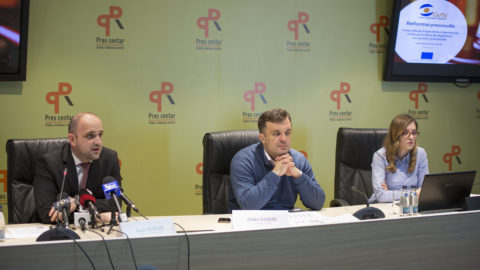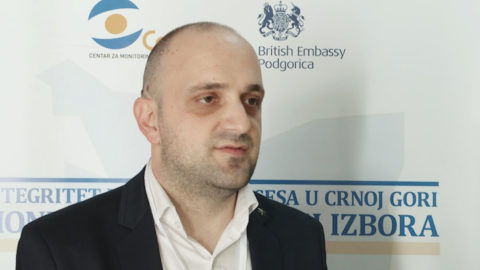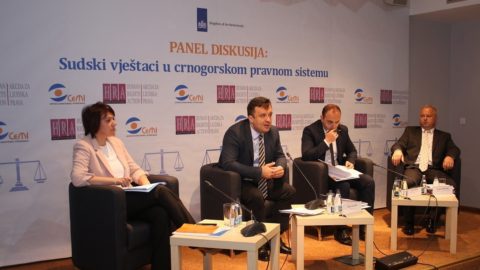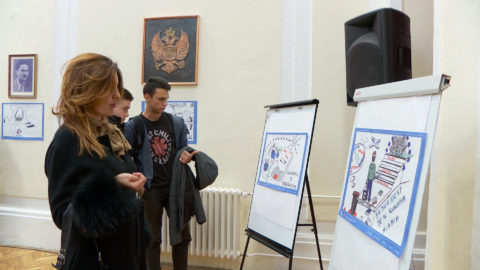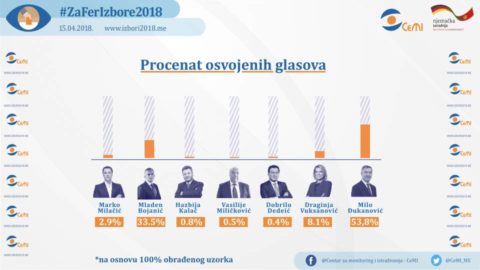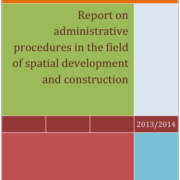It’s necessary to work more specifically and to work harder on the activism of young people in Montenegro and organizing training in entrepreneurship and career development, as well as info day for future students, should become practice not just in the capital, but in the northern municipalities as well.
That estimated Head of Policy and Research Department of Centre for Monitoring and Research (CeMI) Marko Savić at the conference, which is the last activity of the project “Training of young people from the northern municipalities of Montenegro for the labor market”, which we are implementing with the financial support of the Ministry of Sports of Montenegro.
Savić said that CeMI has organized surveys in Nikšić, Plužine, Žabljak and Pljevlja, which included over 1.2 thousand third grade students of all the high schools.
“The survey consisted of one simple question, which was what they were planning to do after high school. You had three options. One was that you were going to develop your own career, by looking for a job. The other one was that you were going to try to develop your own business, entrepreneurship. The third one was that you were going to attend university”, clarified Savić.
He said that over 90% of young people chose to attend university.
“It’s a small number of those who picked one of the other options. In our society the number of those who attend university is growing larger, while the number of those who decide to work on a craft or on specializing certain skills which they couldn’t gain in high school, grows smaller”, says Savić.
According to him, a two day training on entrepreneurship and career development was organized in Nikšić for students of that municipality and also Plužine, after which all the students acquired concrete guidelines for writing a CV and motivational letter, which can help them apply for a job.
“The same methodology was used for organizing trainings in Pljevlja, where we actually merged the students from Žabljak and Pljevlja. Also, there were two info days organized, one in Nikšić, the other in Pljevlja, where three universities from Montenegro presented”, says Savić.
He pointed out that implementation of the project showed that it’s necessary to work harder and work more specifically on the activism of young people, noting that it left a “sour taste” because in Plužine and Žabljak out of all the respondents, there were up to five students who chose to develop a career or start a buisness.
“It gave the impression that the problem of our society is that we have centralized all the events, including the ones for young people, in a few bigger municipalities in the central region or the coastal region. We didn’t try enough to get young people from northern municipalites used to the fact that organizing trainings and info days should be practice, and not an exception in their town. I think that we succeeded in getting closer to young people by coming to their doors”, clarified Savić.
Executive Director of CeMI, Nikoleta Đukanović, said that exists an obvious gap between the possibilities to acquire an education and economic opportunities, especially regarding the job market.
“On the one hand, even though they finish high school, young people don’t possess enough practical skills and knowledge which are necessary for doing certain jobs, so in that way they are not adequately prepared for the job market and have a hard time finding a job. The ones that are successful continue their education at higher education institutions and because of that on the other hand, they leave their towns”, explains Đukanović.
She pointed out that without any knowledge of the job market, employment opportunities, activities of the Employment Agency, economic situation of the municipality the young people live in, especially as she said, the northern municipalities, they are forcibly marginalized on the job market.
“Specifically with the aim to lower the number of unemployed young people, CeMI had a goal with this project to implement those activities which influence the key decision makers and groups, so that this number would grow smaller. We think that we mostly completed this goal, which is contributing to the improvement of socio-economical situation of young people in the northern municipalities”, says Đukanović.
The key results achieved with this project are, as she said, creating a network between the local goverment, schools, Employment Agency, private sector and non-governmental organizations in the northern municipalities.
“On the other hand, through a set of trainings, it was worked on strengthening personal work abilities and expertise of high school students and increasing the level of public awareness about the possibilites of overcoming the problem of youth unemployment”, evaluates Đukanović.
Project coordinator for the UN Youth Programme, Jelena Miljanić, evaluates that the biggest deficiency in Montenegrin society is that a strong system doesn’t exsist, which would support young people and help them make good, quality and informed decision in their lives.
“If the family, school and other services are strong and everybody works with the youth, such a system can help a young person make the best decisions relative to their interests, their resources and relative to the situation outside”, says Miljanić.
According to her, on the job market and for the success in life in general, skills that are transferable and universal are important.
“Research shows that to be successful in life it’s not that important what university or what high school you finished, rather how well you work in a team, know how to communicate, whether you’re proactive, how well you adjust to new situations, if you have integrity and ethics. Those are the skills and attitudes that near you to success,” says Miljanić.
She points out that without information about a certain opportunity it’s impossible to take advantage of it, noting that it’s important for young people to inform themselves through every channel available.
Director of Directorate for Youth in the Ministry of Sports, Nenad Koprivica, said that the priority of that sector is the functioning of existing and opening of new youth clubs and center.
“We have about ten active youth clubs across Montenegro and in cooperation with local governments, we are working on establishing new youth clubs. It is important to mention some regional activities, primarily the establishment of the Regional Office for Youth Cooperation, with headquarters in Tirana, and whose local office exist in Podgorica”, says Koprivica.
He pointed out that CeMI’s project fits entirely with the priority of the Directorate for Youth, which relates to youth employment and creating conditions for their easier access to the job market.
President of the Governing Board of the Union of High School Students of Montenegro (UNSCG), Andrea Mićanović, said that that organization strives to inform about the problems that students face in school communities and that it uses feedback as a cause for projects and other activities.
“When we spoke to high school students in Montenegro about what’s missing in their preparation for the job market within the educational process, they pointed out that it’s necessary to work continuously to improve the quality of practical teaching”, points out Mićanović.
As she said, high school students from the northern region often say that practical teaching in secondary vocational schools is not at an adequate level, because it happens that all the conditions for it are not completed.
“On the other hand, it also happens that the record of completion of practical teaching for every student is not done in the correct way, or rather that completion of practical teaching in secondary vocational schools is not done on a regular basis. There are certain steps forward in this area lately, but the informations that we are getting from high school students show that there’s still room for investments”, says Mićanović.
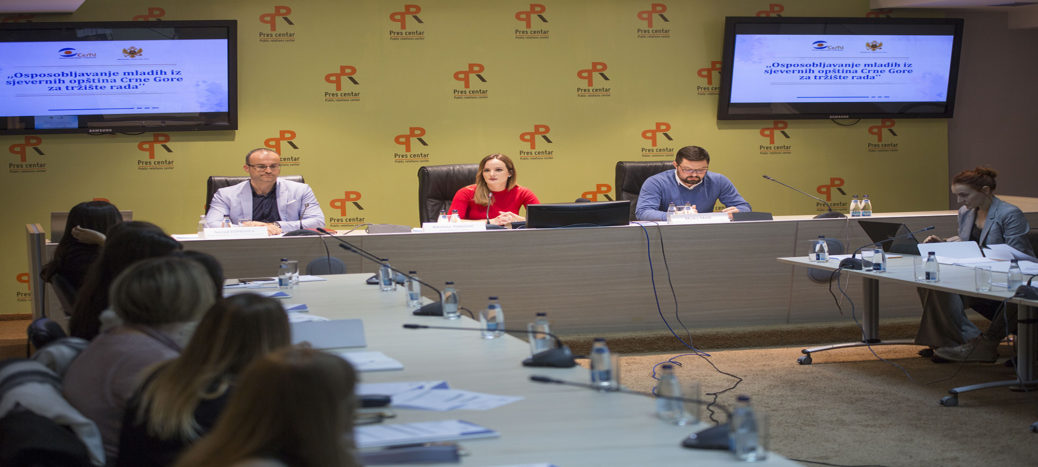


 Montenegrin
Montenegrin